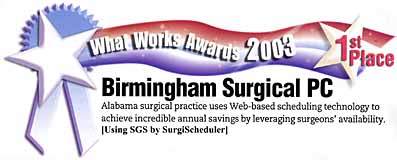 |


January, 2008
Introduction
Juggling Routine
Scheduling Central
Recent Update
Alabama surgical practice uses Web-based scheduling technology
[SurgiScheduler's SGS] to achieve incredible annual
savings by leveraging surgeons' availability.
Introduction: What Works Awards: Best of the Best
The best healthcare IT case histories
By Robin Blair, Editor, and Karin Lillis, Managing
Editor
Health Management Technology (HMT) is known for its case
histories. We believe, editorially, that nothing highlights
the real usability of healthcare IT products like customers
who will stand up for those products and let their stories be
told. "What Works" is a specialized case history
format that focuses upon IT solutions that demonstrate
quantifiable results.
Every year, HMT publishes between 15 and 25 What Works case
histories.
At the end of the year, we impanel up to seven judges selected from within
the healthcare IT industry to read all the What Works articles published
that year and to determine for us the top three winners.
With pleasure and pride, we present the winners of the 2003 What
Works
Awards competition...All winners, healthcare organizations and vendors
deserve commendation for their success in 2003.
Top
Birmingham Surgical PC
Headquartered in Birmingham, Alabama, Birmingham Surgical PC
(BSPC) is a general surgery group practice with five surgeons
who practice at four different surgical locations,
representing a weekly volume of 75 cases. These cases were
organized by four nurse schedulers, one at each office.
Juggling Routine
BSPC surgical scheduling tasks were, at best, cumbersome and,
at worst, a financial drain on the small surgical group.
Nurse schedulers were armed with only a primitive desktop
scheduling tool that relied on Excel. Each day, they would
receive multiple phone calls or would meet with the surgeons
to review daily surgical schedules. The nurse schedulers had
to manually juggle and analyze a variety of data, with the
ultimate goal of identifying each surgeon’s availability
to leverage their time and resources.
An audit of nurse scheduler’s time revealed that they
were spending, on average, 35 hours a month on non-productive
scheduling tasks, which led to increased personnel costs.
BSPC also wanted to leverage the five surgeons’ time
better. It was important to coordinate surgeons’
schedules to make them available to assist on another, or
they would need to hire a surgical assistant at a cost to the
surgical group of about $500 per surgery.
Top
Scheduling Central
BSPC adopted WebScheduler Surgical Group Scheduler [now
called SurgiScheduler’s SGS] from Lafayette, Calif.
This customizable Web and PDA-accessible practice management
offering allows BSPC to streamline not just scheduling, but
also surgical assists, surgical consults, rounding lists,
vacation, conferences, and call schedules.
The initial implementation was launched in August 2002, and
within a month, BSPC was using the SGS Calendar exclusively.
It was not long before the schedulers became adept at the
intuitive procedures to post additions and changes to the
BSPC Calendar—so comfortable that several enhancements
soon were added, especially in the area of reporting,
because nurse schedulers saw additional opportunities to
improve the organization’s results.
Cost criterion was met with a minimum upfront, first-year
investment: an initial $300 licensing fee and a quarterly
$750 fee for a total first year investment of $3,300.
[BSPC was our development partner. The normal set up fee depending on the size of the practice ranges from $550 to $1850. Typical first year costs range from 3,300-6,500.]
With all scheduling tasks centralized [through web
software], nurse schedulers’ time has been reduced, and
there is no longer the need to drive from location to
location to keep the schedules correct. Base on original
projections, BSPC reduced nurse schedulers’
unproductive time by 35 hours a month—in effect,
eliminating all of the unproductive hours first noted in its
audit. At $18 an hour, this represents an annual savings of
$7,560 for a nurse scheduler’s time.
BSPC dramatically exceeded its own objectives in better
leveraging surgeons’ time and schedules so they can
assist each other in surgery, rather than incurring costs
for surgical assistants. Instead of the 10 percent reduction
in using surgical assistants originally targeted, BSPC
achieved almost a 30 percent reduction. This means that BSPC
was able to arrange its surgeons’ schedules so they can
assist one another an average of 25 surgeries of 75
surgeries per month. At a $500 per case surgical assist fee,
this represents $12,500 per month in savings, or $150,000 in
savings annually. In just the first year, with a total
investment of $3,300, BSPC added an extra $150,000 in gross
charges, or a gross ROI of 45 times its investment. Top
Recent Update
“Things are continuing to run smoothly,” sums up
Brian Lasker, administrator for BSPC. The practice has
implement a small update to the system, but no new major
components have been added in the last year.
Top
NOTE: SGS works in conjunction with and as a valuable
addition to existing practice management systems. While
BSPC uses MYSIS Healthcare, SGS can be used with
Medical Manager, GE / Millbrook, and a variety of other
systems.
|
 |
 |
 |
|
 |


